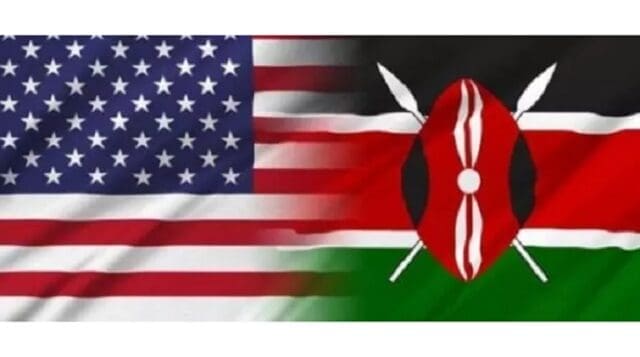
When Topeka resident and Baker University School of Nursing student Jessica Emory signed up for a medical mission to a clinic in the Upper Matasia area of Ngong in Kenya, she expected to encounter people with health conditions that couldn’t be improved.
But Emory was overwhelmed by one patient: a man with an extremely large wound on his leg that started as a scratch in 1998 and increasingly grew worse because of infection and lack of medical intervention.
All that could be done was to send him home with a bag of supplies to help him keep the wound clean.
“He needed surgery,” she said.
Emory and six other Baker University School of Nursing students and May graduates journeyed in mid-June to Kenya as part of a Streams of Hope International medical mission to work at the health clinic established a few years ago by Baker School of Nursing alumni and Lawrence residents Ephantus Kimori Mwangi and his wife, Hottensiah Kimori.
The couple, who are from Kenya and founders of the not-for-profit Streams of Hope International, made a commitment to establish the clinic and Neema Hospital after a trip to their homeland in 2003 that revealed an onslaught of HIV/AIDS, persistent typhoid fever and widespread poverty.
In addition to Emory, Mwangi and Kimori, others making the two-week trip in June were Erika Munker, of Topeka, Brette Myers, of Whetmore, Laura Caby, of Topeka, and Nicole Woods, of Topeka, all of whom graduated in May; current nursing school students Corinne Nilsen, of Hesston, and Mercedes Eicher, of Topeka; and Alicia Cardona, a psychiatrist.
Eicher, who had never traveled outside of the United States, said she decided to take part in the medical mission after receiving an email about the trip from the Nurses for Cultural Awareness club at the school of nursing, which is based in the Pozez Education Center at Stormont-Vail HealthCare.
“I thought it would be a really good experience for learning and to personally see different cultures and health care and to help,” she said.
The participants flew out of Kansas City and made stopovers in Dallas and London before arriving in Narobi, the capital and largest city in Kenya. Total flight time was about 18 hours. They stayed in Ngong, a town about 30 minutes away from the clinic.
After a couple of days of preparatory instruction, Eicher said, they worked at the clinic for three days and then toured three area hospitals. The second week was devoted to sightseeing.
Mwangi said the last Streams of Hope medical mission to Kenya was in 2010, when about 550 patients were treated or referred to larger medical facilities that could better address their conditions. This time, more than 600 people were referred or provided services, which included screenings/assessments, nutrition counseling, dental care and diagnosis and treatment of cervical cancer, breast cancer and HIV/AIDS.
Many of the patients walked more than three hours to seek health care at the clinic.
The Baker students/alumnae performed assessments and registered patients for about eight hours each day. Other services were provided by the clinic’s staff and other health care volunteers.
The most common ailments seen at the clinic were malaria, upper respiratory problems, parasite infections, hypertension, muscle strain and back aches, obstetric-gynecology concerns, depression, urinary tract infections and teeth and eye problems.
Mwangi said some of the most serious conditions included a 12-year-old boy with a severe heart murmur who needed two heart valves replaced and a teenage girl with lumps in her breast who needed a biopsy and radical mastectomy.
The Baker students/alumnae were surprised by the lack of supplies and equipment at the hospitals they toured. Myers said up to three patients shared a bed, and monitors were absent in patient rooms. Hospital laboratories tested for malaria and HIV/AIDS but had no way to determine other diseases or conditions.
“It’s really just taking stabs in the dark (to get a diagnosis),” Myers said.
Mwangi said Streams of Hope International accepts donations of diagnostic and laboratory equipment and hospital supplies. Volunteers, especially ophthalmologists and dentists, also are needed.
Emory said she and the other Baker students/alumnae are raising money so the man with the leg wound and the teenager suspected of having breast cancer can receive care at larger medical facilities.
Mwangi said the clinic and Neema Hospital already have received funding from the Baker School of Nursing faculty and students, Trinity Lutheran Church in Topeka, Victory Bible Church in Lawrence and Stormont-Vail School of Nursing Alumni Association.
All of the Baker students/alumnae said they would like to return to Kenya on another medical mission.
“I don’t think you can go once. You have to go back,” Eicher said. “They are an amazingly friendly people and they need a lot.”
For more information about Streams of Hope International or to donate money or equipment, go to its website at www.streamsofhopeinternational.org.
Source:cjonline.com







